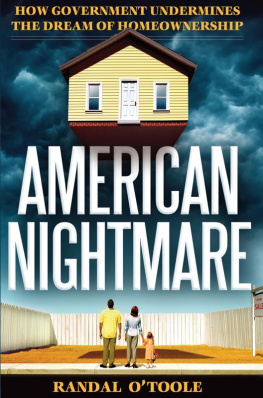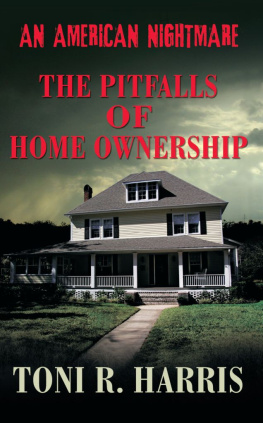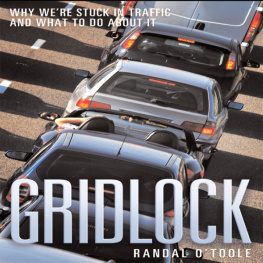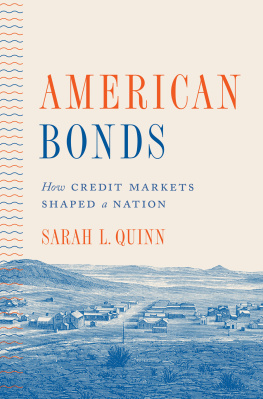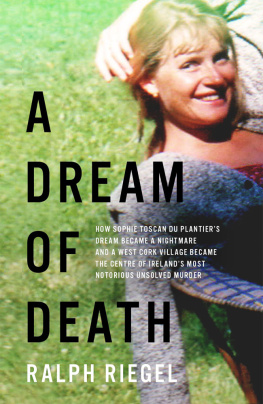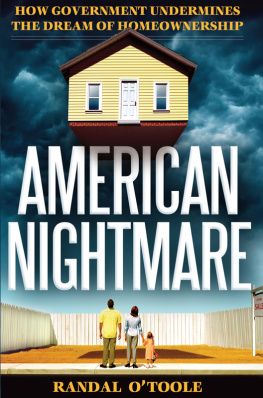Randal O’Toole - American Nightmare: How Government Undermines the Dream of Home Ownership
Here you can read online Randal O’Toole - American Nightmare: How Government Undermines the Dream of Home Ownership full text of the book (entire story) in english for free. Download pdf and epub, get meaning, cover and reviews about this ebook. year: 2012, publisher: Cato Institute, genre: Politics. Description of the work, (preface) as well as reviews are available. Best literature library LitArk.com created for fans of good reading and offers a wide selection of genres:
Romance novel
Science fiction
Adventure
Detective
Science
History
Home and family
Prose
Art
Politics
Computer
Non-fiction
Religion
Business
Children
Humor
Choose a favorite category and find really read worthwhile books. Enjoy immersion in the world of imagination, feel the emotions of the characters or learn something new for yourself, make an fascinating discovery.
- Book:American Nightmare: How Government Undermines the Dream of Home Ownership
- Author:
- Publisher:Cato Institute
- Genre:
- Year:2012
- Rating:5 / 5
- Favourites:Add to favourites
- Your mark:
- 100
- 1
- 2
- 3
- 4
- 5
American Nightmare: How Government Undermines the Dream of Home Ownership: summary, description and annotation
We offer to read an annotation, description, summary or preface (depends on what the author of the book "American Nightmare: How Government Undermines the Dream of Home Ownership" wrote himself). If you haven't found the necessary information about the book — write in the comments, we will try to find it.
Randal O’Toole: author's other books
Who wrote American Nightmare: How Government Undermines the Dream of Home Ownership? Find out the surname, the name of the author of the book and a list of all author's works by series.
American Nightmare: How Government Undermines the Dream of Home Ownership — read online for free the complete book (whole text) full work
Below is the text of the book, divided by pages. System saving the place of the last page read, allows you to conveniently read the book "American Nightmare: How Government Undermines the Dream of Home Ownership" online for free, without having to search again every time where you left off. Put a bookmark, and you can go to the page where you finished reading at any time.
Font size:
Interval:
Bookmark:
AMERICAN
NIGHTMARE
Dedicated to the memory of my friend Chris Walker, whose work on land-use and transportation issues should inspire everyone who supports free markets and freedom of choice.
Copyright 2012 by the Cato Institute.
All rights reserved.
Library of Congress Cataloging-in-Publication Data
OToole, Randal.
American nightmare : how government undermines the dream of home ownership / by Randal OToole.
p. cm.
Includes bibliographical references and indexes.
ISBN 978-1-937184-88-9 (hardback : alk. paper)
1. Home ownershipUnited States. 2. Housing policyUnited States. 3. House buyingUnited States. I. Title.
HD7287.82.U6O86 2012
333.3380973dc23
2012012197
Printed in the United States of America.
C ATO I NSTITUTE
1000 Massachusetts Ave., N.W.
Washington, D.C. 20001
www.cato.org
Cato Institute
Founded in 1977, the Cato Institute is a public policy research foundation dedicated to broadening the parameters of policy debate to allow consideration of more options that are consistent with the traditional American principles of limited government, individual liberty, and peace. To that end, the Institute strives to achieve greater involvement of the intelligent, concerned lay public in questions of policy and the proper role of government.
The Institute is named for Catos Letters, libertarian pamphlets that were widely read in the American Colonies in the early 18th century and played a major role in laying the philosophical foundation for the American Revolution.
Despite the achievement of the nations Founders, today virtually no aspect of life is free from government encroachment. A pervasive intolerance for individual rights is shown by governments arbitrary intrusions into private economic transactions and its disregard for civil liberties.
To counter that trend, the Cato Institute undertakes an extensive publications program that addresses the complete spectrum of policy issues. Books, monographs, and shorter studies are commissioned to examine the federal budget, Social Security, regulation, military spending, international trade, and myriad other issues. Major policy conferences are held throughout the year, from which papers are published thrice yearly in the Cato Journal. The Institute also publishes the quarterly magazine Regulation .
In order to maintain its independence, the Cato Institute accepts no government funding. Contributions are received from foundations, corporations, and individuals, and other revenue is generated from the sale of publications. The Institute is a nonprofit, tax-exempt, educational foundation under Section 501(c)3 of the Internal Revenue Code.
C ATO I NSTITUTE
1000 Massachusetts Ave., N.W.
Washington, D.C. 20001
www.cato.org
Contents
Figures
Tables
Along with millions of other Americans, I watched in shock and awe as the worlds financial markets melted down in September 2008. The knowledge that this was the beginning of a major recession was especially heartbreaking because several of my colleagues and I had been warning people of this imminent collapse, and ways to prevent it, for several years.
Numerous researchers have shown that government regulation has made American housing unnecessarily expensive and made many regional housing markets prone to bubbles. In recent years, the focus of state and local land-use regulation has been a war on sprawl that, in practice, became a war on single-family homes. Because 84 percent of people living in single-family homes own those homes, compared with just 14 percent of people living in multifamily housing, a war on single-family homes was a war on homeownership.
In 1997, for example, planners in my former hometown of Portland, Oregon, set a target of reducing the share of Portland-area households who lived in single-family detached homes from 68 percent in 1995 to 41 percent by 2040. If they are successful, hundreds of thousands of people who would have preferred single-family homes will be stuck in apartments instead. To achieve this goal, they limited the land available for new single-family homes while they used tax dollars to subsidize construction of multifamily dwellings. Similar plans have been or are being written for cities and metropolitan areas across the nation.
In places with relatively unregulated housing markets, housing is inexpensive, and when demand increaseswhether because of population growth, low interest rates, or loosened lending standards homebuilders build more homes. When new single-family homes are restricted, housing becomes expensive, and increases in demand lead to higher prices rather than more housing, while decreases in demand result in lower pricesin other words, a housing bubble.
The lesson I learned from the housing bubble was that the American dream of owning a single-family home is so powerful that many Americans will go to extraordinary lengths to achieve that dream, including dedicating more than half their incomes to 30-year mortgages on those homes. But many other people learned a very different lesson: the mantra they repeated over and over was As much as they might want to, some people shouldnt try to own their homes.
Homeownership has let us down, said Time magazine. The dark side of homeownership is now all too apparent: foreclosures and walkaways, neighborhoods plagued by abandoned properties and plummeting home values, a nation in which families have $6 trillion less in housing wealth than they did just three years ago.
Homeownership is overrated, says urban planner Richard Florida. Too many people in economically distressed communities are trapped in homes they cant sell, unable to move on to new centers of opportunity. Florida thinks more people should rent and that we should updat[e] our definition of the American dream.
Is the American dream of homeownership dead? In my opinion the American Dream as we know it is dead, wrote financial adviser Suze Orman. In many areas of the country, the dream of homeownership has backfired. Real estate values have deflated to such an extent that a record number of people owe more than their homes are worth.
American Nightmare explores the questions raised by the debate over homeownership. What is the right homeownership rate? Is universal homeownership possible or even desirable? What roles do the mortgage-interest deduction, Federal Housing Administration mortgage insurance, and other government housing programs play in influencing peoples decisions to buy rather than rent their homes? What are the real lessons of the housing-market crash? To answer these questions, this book looks at the history of home-ownership and its role in peoples lives and the economy as a whole.
As recently as 250 years ago, it is likely that fewer than 1 percent of the worlds families lived in their own homes. Even just 25 years ago, homeownership was a privilege enjoyed by only a small minority of people. Today, at least 60 percent of the worlds families own their own homes, and the percentage in many countries is much higher.
The United States was long a leader in this remarkable transformation. Throughout much of the 20th century, high U.S. homeownership rates contributed to the nations booming economy, encouraging other countries to remove local barriers to homeownership. But homeownership in this country may be little more than an accident of history. At the time the New World was being colonized, nearly everyone in Europe effectively rented their lands from their monarch, and many Dutch, French, and Spanish land grants in North America followed this pattern. But in 1629, King Charles I of England offered Massachusetts colonists fee simple landthat is, the opportunity to own land after paying a single fee rather than annual rents. Soon after the American Revolution, this form of land tenure became dominant in the United States, and Europeans, Asians, and others who wanted to own rather than rent land came to America for the opportunity to do so.
Next pageFont size:
Interval:
Bookmark:
Similar books «American Nightmare: How Government Undermines the Dream of Home Ownership»
Look at similar books to American Nightmare: How Government Undermines the Dream of Home Ownership. We have selected literature similar in name and meaning in the hope of providing readers with more options to find new, interesting, not yet read works.
Discussion, reviews of the book American Nightmare: How Government Undermines the Dream of Home Ownership and just readers' own opinions. Leave your comments, write what you think about the work, its meaning or the main characters. Specify what exactly you liked and what you didn't like, and why you think so.

